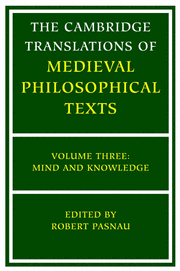Book contents
- Frontmatter
- Contents
- Acknowledgments
- General Introduction
- 1 ANONYMOUS (Arts Master c. 1225) The Soul and Its Powers
- 2 ANONYMOUS (Arts Master c. 1270) Questions on De anima I–II
- 3 BONAVENTURE Christ Our One Teacher
- 4 HENRY OF GHENT Can a Human Being Know Anything?
- 5 HENRY OF GHENT Can a Human Being Know Anything without Divine Illumination?
- 6 PETER JOHN OLIVI The Mental Word
- 7 WILLIAM ALNWICK Intelligible Being
- 8 PETER AUREOL Intuition, Abstraction, and Demonstrative Knowledge
- 9 WILLIAM OCKHAM Apparent Being
- 10 WILLIAM CRATHORN On the Possibility of Infallible Knowledge
- 11 ROBERT HOLCOT Can God Know More than He Knows?
- 12 ADAM WODEHAM The Objects of Knowledge
- Textual Emendations
- Bibliography
- Index
10 - WILLIAM CRATHORN On the Possibility of Infallible Knowledge
Published online by Cambridge University Press: 23 December 2009
- Frontmatter
- Contents
- Acknowledgments
- General Introduction
- 1 ANONYMOUS (Arts Master c. 1225) The Soul and Its Powers
- 2 ANONYMOUS (Arts Master c. 1270) Questions on De anima I–II
- 3 BONAVENTURE Christ Our One Teacher
- 4 HENRY OF GHENT Can a Human Being Know Anything?
- 5 HENRY OF GHENT Can a Human Being Know Anything without Divine Illumination?
- 6 PETER JOHN OLIVI The Mental Word
- 7 WILLIAM ALNWICK Intelligible Being
- 8 PETER AUREOL Intuition, Abstraction, and Demonstrative Knowledge
- 9 WILLIAM OCKHAM Apparent Being
- 10 WILLIAM CRATHORN On the Possibility of Infallible Knowledge
- 11 ROBERT HOLCOT Can God Know More than He Knows?
- 12 ADAM WODEHAM The Objects of Knowledge
- Textual Emendations
- Bibliography
- Index
Summary
Introduction
The Englishman William Crathorn was a Dominican master of theology at Oxford. His only known writings are a collection of questions on the first book of Lombard's Sentences, delivered over the academic year 1330 – 31. Crathorn is by no means the most gifted of theologians working at that time, but he is nevertheless worth reading, because he was willing to take bold and interesting stands on the central philosophical questions of his day. Though sometimes the results seem absurd, at other times they seem prescient.
This is particularly so for the first of Crathorn's questions on the Sentences. The ostensible topic is whether we can have knowledge of the faith through our own natural light. This question gets swallowed up, however, by a long series of fourteen conclusions that address general questions regarding cognition (1–7) and knowledge (8–14). The latter group first sets out a series of skeptical arguments showing that the senses do not yield any certain knowledge (8–10), and then offers a most Cartesianlike solution to these arguments (11–13).
The first group of conclusions focuses on the cognitive process, and it is here that Crathorn looks less prescient and more absurd. He defends the traditional theory of species and mental word as internal likenesses of external objects (compare Translation 6), but insists on taking ‘likeness’ literally, so that in perceiving, and even in thinking, the soul actually takes on the color, temperature, etc., of the things perceived (conclusion 7).
The long first conclusion requires special comment. Here Crathorn makes the obscure claim that that by which we formally cognize is our cognitive power.
- Type
- Chapter
- Information
- The Cambridge Translations of Medieval Philosophical Texts , pp. 245 - 301Publisher: Cambridge University PressPrint publication year: 2002



